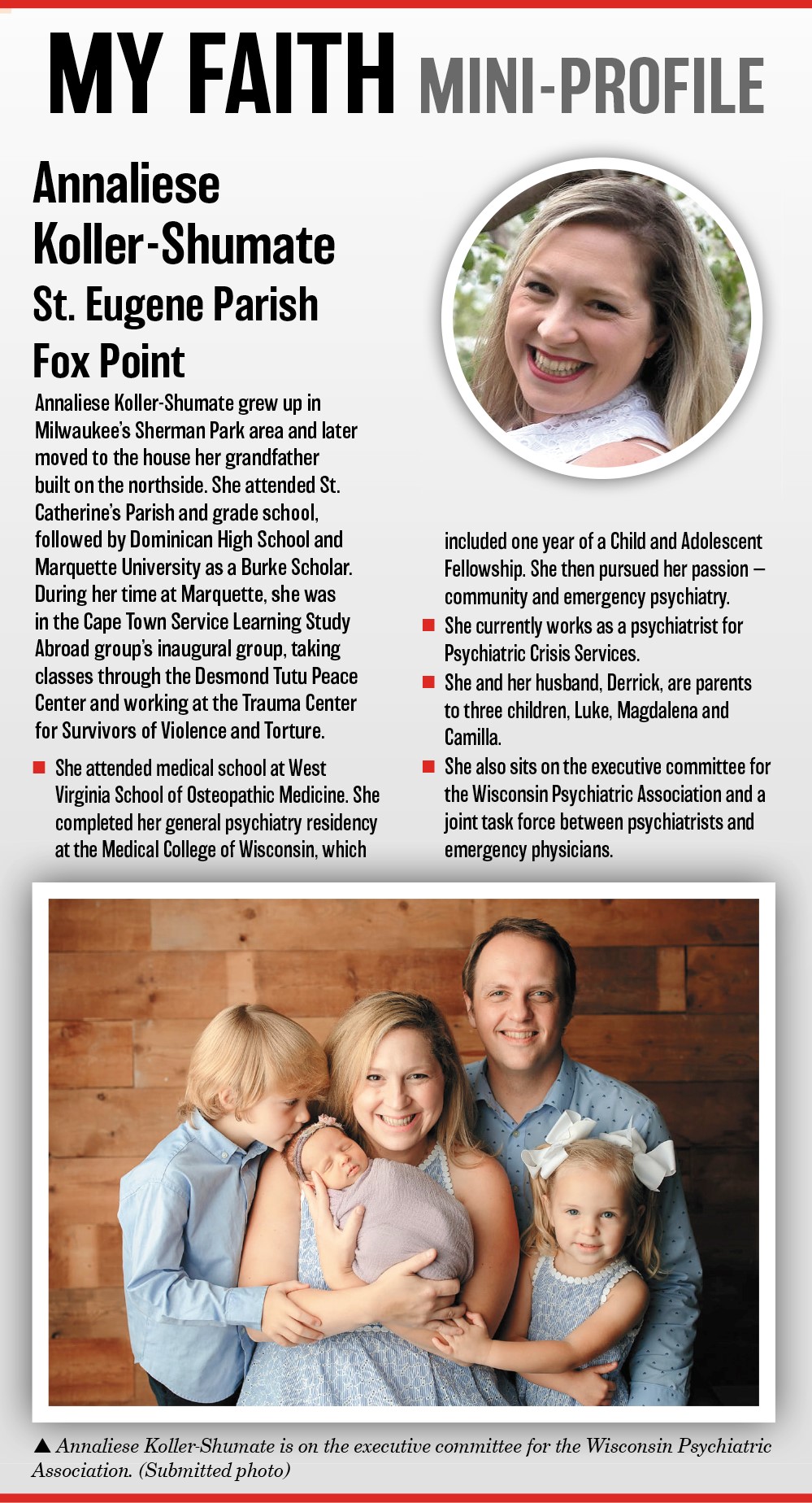Body of Christ
What made you decide to become a physician and on psychiatry as a specialty?
I think I have known since I was a little girl that I wanted to be a doctor. My mother, a burn nurse, inspired a love for medicine and, most of all, for patient care. Being rooted in always knowing that I wanted to pursue medicine initially led me to pursue science at Marquette. However, I didn’t love being totally immersed in the sciences. My wise Jesuit pre-med advisor told me to ditch the biology degree and pursue something else while still taking all the required science classes needed and taking the MCAT. I wanted to learn about the rest of the world, so I moved to South Africa for six months and changed my major. I was convinced that I was going to be an OB-GYN, and I loved all of my surgical rotations, and my husband and I even got to work for a month in Sierra Leone at a rural hospital performing surgeries and managing the whole hospital and outpatient clinics.
What changed?
Psychiatry surprised me in medical school. I loved my rotations, the patients, and it was amazing to see patients improve. I was amazed at how many areas of psychiatry exist and how no matter what field — be it surgical or internal med or even dermatology — you can’t really escape doing psychiatric care. I am so grateful that I could pursue psychiatry and return to my hometown to complete my training. I am passionate about psychiatry and love working in an emergency setting where I can see patients of all ages and psychiatric needs, often in acute crisis.
What should people of faith understand when helping their friends and family members who suffer from a mental illness?
First, so many among us suffer from mental illness or know and love someone struggling with mental illness. You are not alone, and neither is this person. They are made in the image and likeness of God. If you or someone you know is struggling, listen to them with respect and ask how you can help support them. If they identify a need, let them know you support them in seeking care.
How did your faith help you get through being a front-line medical worker during the pandemic?
My faith has been my rock through this pandemic. I was pregnant and working face-to-face in the ER with a very high-risk patient population. Those living with mental illness were especially hard-hit by the pandemic. Schizophrenics were 10 times as likely to contract COVID-19 and three times as likely to die from COVID-19.
How was prayer involved?
I tend to use my prayer life as meditation, often meditating on the rosary or just utilizing it as a centering prayer. Our church, St. Eugene, made Mass, our priests and our faith accessible in different and new ways. Especially meaningful was witnessing my son, Luke, grow in his faith as he prepared for the First Eucharist.
You are the product of Catholic schools and now serve on the school commission for the parish school your children attend. How has your Catholic education shaped your worldview, and how do you hope it will shape your children?
I had an incredible experience at the Catholic schools. My strong education was firmly anchored in faith, establishing a moral compass and a passion for service to others. I appreciate how deeply rooted these institutions were in their respective communities and how they are called to serve those communities. Within these places, I saw how the community supported one another in times of great tragedy. They literally became the hands and feet of Christ. I also love that our schools are associated with a parish and the Mass, connecting us all at a deeper family level. I wanted that feeling of being in a community, of being a family and being a man and woman for others that Catholic education provides.
You work in a field where a lot of people experience burnout. What do you do for yourself?
Burnout is multifactorial. I have a career where I am satisfied and recognized for the hard work I do, which greatly prevents burnout. I also work with amazing people, and we like to laugh a lot, so we take advantage of this when we can because the emotional toll of the heavy stuff can be very burdensome. At home, some of the things I do for self-care include cooking, planning vacations (even if just in my head), spending time with my family and enjoying a good period drama.

